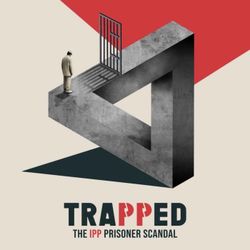Latest episode
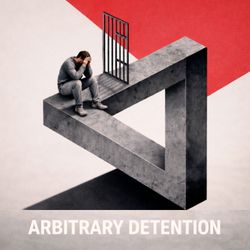
22. 22. Arbitrary Detention
40:03||Season 1, Ep. 22Joe Outlaw’s trial, an update on Aaron Graham’s story and a landmark complaint to the United Nations. Roddy Russell travels to Middlesbrough to follow the trial of Joe Outlaw in July 2025, an Imprisonment for Public Protection (IPP) prisoner whose rooftop protests at HMP Manchester and HMP Franklin has brought renewed attention to one of the most controversial sentences in UK legal history. Joe argues that the mental torture caused by his indefinite sentence drove his actions, making this one of the first UK cases where IPP-related psychological duress is formally raised as a defence.Outside Teesside Crown Court, Roddy meets the family members, campaigners, and supporters who gather daily to support Joe. We hear how IPP sentences devastate mental health, fracture families, and trap people in a cycle of recall with no clear end point. Here Roddy also catches up with campaigner Cherrie Nichol, whose brother Aaron Graham is the longest IPP serving prisoner. Aaron’s repeated recalls, including being returned to prison after getting lost while trying to comply with licence conditions, illustrate how the system punishes vulnerability and untreated mental illness.We also hear about the landmark legal complaint submitted to the UN Working Group on Arbitrary Detention, led by barrister and international law expert Dr Muin Boase. The submission argues that IPP prisoners are being arbitrarily detained in breach of International human rights law, due to the grossly disproportionate length and uncertainty of their sentences. Campaigners Shirley Debono and Bernadette Emerson travel to Downing Street with MPs and peers to deliver a letter supporting the complaint. Shirley speaks movingly about her son Shaun Lloyd, who remains trapped in the IPP system, and the devastating impact on his children.Outside Parliament, Lord Tony Woodley and Baroness Claire Fox speak to campaigners about the need for sustained political pressure. Could international scrutiny finally force the UK government to confront what many describe as one of the greatest stains on the modern justice system? How long can a country committed to human rights justify a sentence with no end?Read about the complaint here: https://greatjames.co.uk/wp-content/uploads/2025/09/Complaint-Against-the-UK-on-IPP-sentences.pdfContributors in order of appearance: Roddy Russell, brother of IPP serving prisoner Robert Mandy Outlaw, Joe Outlaw’s auntCherrie Nichol, IPP campaigner, sister of Aaron GrahamStacey Clough, IPP campaignerDr Muin Boase, Barrister and senior lecturer in International Law, University of DerbyShirley Debono – IPP campaigner, mother of Sean LloydLord Tony Woodley – Member of the House of LordsBaroness Claire Fox – Member of the House of LordsVoices in archive:Joe Outlaw, IPP PrisonerAaron Graham, IPP PrisonerProduction Team:Presenter: Roddy Russell | @1roddyRussellExecutive Producer: Melissa FitzGerald | @MelissafitzgProducer: Steve Langridge | @SMLANGERSConsultant: Hank RossiAn Ear Worm Production for the Institute of NowGet involved:➕ Follow Trapped on X, TikTok, Facebook or Instagram @Trapped_Pod 🔎 Search #IPPScandal for more stories. 🗣️ Read more about the IPP campaign: UNGRIPP | www.ungripp.com | @UNGRIPP | IPP Committee In Action @ActionIpp | injustice_of_ipp ✔️ Like, follow and share this podcast to get people listening: knowledge is power and the more who know, the harder it is for injustice to take place. ✍️ Write to your MP and ask them to raise questions about IPPs in Parliament⬇️ Download the Trapped series episode transcripts here: https://drive.google.com___
More episodes
View all episodes
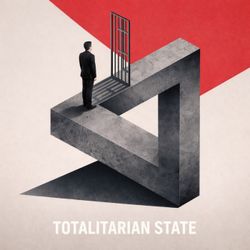
21. 21. Totalitarian State
35:01||Season 1, Ep. 21Former Justice Secretary, Alex Chalk KC, and retired judges, Sir John Saunders and Simon Tonking, speak candidly about the IPP scandal. Alex Chalk, who served as Lord Chancellor and Secretary of State for Justice until 2024, speaks about the moral and political complexity of IPPs, calling the sentence “almost totalitarian”, a phrase that would have been politically explosive while he headed up the Ministry of Justice. While in office, Chalk introduced a major reform, reducing the licence period for released IPP prisoners from 10 years to 3, freeing around 1,742 people from lifelong supervision. He characterises IPPs as a “toxic legacy” and a “stain” on the justice system but explains why he did not accept calls to give all remaining IPP prisoners a definite end date. He argues that many long-term unreleased IPP prisoners may have been made more dangerous by the system itself, leaving ministers fearful of the political and personal consequences if a released prisoner were to reoffend seriously. This is the political fear at the heart of the issue: a fear that keeps ministers from doing what even they privately acknowledge is morally right. The retired judges, Simon Tonking and Sir John Saunders explain how the 2003 Criminal Justice Act made IPPs almost mandatory, even for offences with very short tariffs. They now regret their role in imposing sentences that have kept people incarcerated many years beyond the punishment originally judged proportionate to their crimes. They describe systemic failures: lack of courses, risk-averse parole decisions, and an impossibly high release test. They argue that justice requires one simple remedy: an end date. Without this, they warn, prisoners are left without the most basic element of rehabilitation: hope. There is a growing contradiction within the justice system: nearly all experts, including former ministers, judges, parole board members and human rights organisations, now agree the IPP sentence is fundamentally unfair. Yet political fear, of public backlash, media headlines and potential reoffending, continues to block the bold action needed to resolve the crisis. Despite the recent improvements, progress is too limited to provide justice to those, like the Roddy’s brother Rob, who remain imprisoned far beyond their tariffs. With more than 2,500 people still in custody on IPPs, many over a decade past their tariff, the current pace of release is too slow - but if politicians won’t end this injustice, who will? Contributors in order of appearance: Rt Hon Alex Chalk, KC Roddy Russell, brother of IPP serving prisoner Robert Simon Tonking, Retired Judge Sir John Saunders, Retired High Court Judge Andrew Morris, former IPP prisoner and Trustee of the Howard League Amy-Clare Martin, Crime Correspondent, The Independent @AmyClareMartin Production Credits:Presenter: Roddy Russell | @1roddyRussellExecutive Producer: Melissa FitzGerald | @MelissafitzgProducer: Steve Langridge | @SMLANGERSConsultant: Hank RossiAn Ear Worm Production for the Institute of NowGet involved:➕ Follow Trapped on X, TikTok, Facebook or Instagram @Trapped_Pod 🔎 Search #IPPScandal for more stories. 🗣️ Read more about the IPP campaign: UNGRIPP | www.ungripp.com | @UNGRIPP | IPP Committee In Action @ActionIpp | injustice_of_ipp ✔️ Like, follow and share this podcast to get people listening: knowledge is power and the more who know, the harder it is for injustice to take place. ✍️ Write to your MP and ask them to raise questions about IPPs in Parliament⬇️ Download the Trapped series episode transcripts here: https://drive.google.com___
20. 20. Duty of Care: "Let My People Go"
36:03||Season 1, Ep. 20An update on Thomas Whites’s story and his sister Clara gets ordained as a minister at Church on the Street. In this episode we hear from Clara White, who updates us on her brother Thomas, who was sentenced in 2012 for the theft of a mobile phone. Thomas was given an IPP sentence with a two-year tariff and has now been imprisoned for over a decade. We last heard from them in our very first episode, ‘Ghost Prisoners’.Clara has campaigned tirelessly for Thomas’s release and mental health treatment, collaborating with Bishop Mick Fleming of Church on the Street in Burnley. Together, they have fought to have Thomas moved from prison to a secure hospital. Clara’s faith and activism led Mick to call her an “accidental preacher,” and eventually, she began training for ordination.In the summer of 2025, Clara finally receives the incredible news that Thomas will be moved to hospital: a moment of immense emotion and relief but which also brings new challenges. This is a familiar story for Roddy as his brother Robert makes his own journey from prison to a secure hospital facility.Roddy also meets David Kirk-Beedon, a former prison chaplain, who discusses his first-hand experiences of the mental health decline that those serving IPP sentences face within the prison system, to whom, he says, the state has a ‘duty of care’. In September 2025, Roddy attends Clara’s ordination as a minister at Church on the Street. We hear how Clara's faith has helped support her through the many dark moments she and her family have faced since Thomas’s IPP sentence was handed down. Thomas’s transfer brings newfound hope: he experiences small freedoms like eating with real cutlery and sleeping with his door unlocked. Yet despite his move to a secure hospital, Thomas, like Robert Russell, is still serving an IPP sentence. We close with Bishop Mick’s invocation of Exodus ringing in our ears: “Let my people go.” Contributors in order of appearance: Pastor Clara White | https://www.cots-ministries.co.uk/team-members/ Bishop Mick Fleming | https://www.cots-ministries.co.uk/ David Kirk Beedon | author and former Prison Chaplain Production Credits:Presenter: Roddy Russell | @1roddyRussellExecutive Producer: Melissa FitzGerald | @MelissafitzgProducer: Steve Langridge | @SMLANGERSConsultant: Hank RossiAn Ear Worm Production for the Institute of NowGet involved:➕ Follow Trapped on X, TikTok, Facebook or Instagram @Trapped_Pod 🔎 Search #IPPScandal for more stories. 🗣️ Read more about the IPP campaign: UNGRIPP | www.ungripp.com | @UNGRIPP | IPP Committee In Action @ActionIpp | injustice_of_ipp ✔️ Like, follow and share this podcast to get people listening: knowledge is power and the more who know, the harder it is for injustice to take place. ✍️ Write to your MP and ask them to raise questions about IPPs in Parliament⬇️ Download the Trapped series episode transcripts here: https://drive.google.com___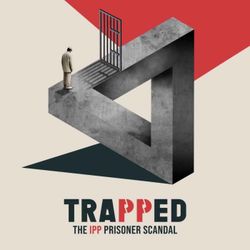
19. 19. A Failed Experiment
40:34||Season 1, Ep. 19The IPP campaign in the spotlight: campaigners stage a protest outside Parliament, while inside, Lord Thomas backs new recommendations to end IPPs.The Trapped team report on two new IPP campaigns: one inside and one outside of Westminster, during the Summer of 2025. On 18th July 2025, the TikTok campaign group injustice_of_ipp staged a demonstration outside Parliament. Protesters and former prisoners describe the inhumane impact of indefinite detention, including widespread mental health crises and suicides (95 deaths to date).Inside Parliament, Lord Thomas of Cwmgiedd, a former senior judge, reflects on how the IPP system was 'a failed experiment', intended to predict dangerousness but resulting in unjust, indefinite punishment. In June, 2025 Lord Thomas and The Howard League for Penal Reform published new recommendations to end the “IPP stain,” arguing that the government’s current IPP Action Plan is ineffective. How will the Prison’s Minister, Lord James Timpson, and the government, react?Read the Howard League’s 2025 proposals to end the detention of people on IPP sentences: https://howardleague.org/news/expert-working-group-publishes-proposals-to-end-the-detention-of-people-on-ipp-sentences/Contributors in order of appearance:Deborah Ingram, mother of IPP serving prisoner LeviRoddy Russell, brother of IPP serving prisoner RobertStacey Clough, partner of IPP serving prisonerAndrew Morris, Former IPP prisoner and Trustee of the Howard LeagueLord Thomas of Cwmgiedd, Lord Chief Justice of England and Wales (2013 – 2017)David Parker, IPP prisoner on licenceMandy Slade, mother of David ParkerKatie Best, wife of IPP serving prisoner JohnMelissa, former prison officer | Off the Cuff with MelAndrea Coomber, Chief Executive of the Howard League for Penal Reform | howardleague.orgVoices in archive:Lord Daniel MoylanLord James Timpson, Minister of State for Prisons, Parole and ProbationProduction Credits:Presenter: Roddy Russell | @1roddyRussellExecutive Producer: Melissa FitzGerald | @MelissafitzgProducer: Steve Langridge | @SMLANGERSConsultant: Hank RossiAn Ear Worm Production for the Institute of NowGet involved:➕ Follow Trapped on X, TikTok, Facebook or Instagram @Trapped_Pod 🔎 Search #IPPScandal for more stories. 🗣️ Read more about the IPP campaign: UNGRIPP | www.ungripp.com | @UNGRIPP | IPP Committee In Action @ActionIpp | injustice_of_ipp ✔️ Like, follow and share this podcast to get people listening: knowledge is power and the more who know, the harder it is for injustice to take place. ✍️ Write to your MP and ask them to raise questions about IPPs in Parliament⬇️ Download the Trapped series episode transcripts here: https://drive.google.com___
18. 18. Destroyed Hope
30:40||Season 1, Ep. 18An update on Victoria’s story. Plus the Prison and Probation Ombudsman, Adrian Usher, Chief Executive of the Howard League, Andrea Coomber, and leading barrister Dr. Felicity Gerry KC, speak about their work to end the IPP Scandal.We last heard from Victoria in Episode 9 ‘Set Up to Fail’ where she’s known as Madison, because she didn’t want to give away her identity. Victoria is currently serving an IPP in the community. Sentenced to a 3 year tariff at 18, Victoria served 12 years in prison and has since been recalled twice for minor licence breaches. We hear how she’s now rebuilding her life on the outside, having battled severe self-harm, poor mental health, and the lasting psychological impact of indefinite detention.We also hear from Adrian Usher, the Prison and Probation Ombudsman (PPO). In September 2023, the PPO issued a bulletin called ‘Learning Lessons Bulletin on the self-inflicted deaths of IPP prisoners’ to highlight how the IPPs sentence presents a unique risk factor for hopelessness and suicide. The Chief Executive of the Howard League, Andrea Coomber, explains how most IPP prisoner recalls are for technical breaches, not new crimes. And leading barrister Dr. Felicity Gerry KC, condemns the IPP sentence as cruel, ineffective, and tantamount to ‘state-sponsored torture.’Finally we meet Victoria’s mum, Karen who describes years of anguish and deteriorating health. Despite some progress, like some probation officers avoiding unnecessary recalls, prison governors becoming more aware of IPPs’ unique needs, and campaigns in Parliament, the uncertainty and hopelessness of the IPP sentence continues to devastate lives.Contributors in order of appearance:Victoria, IPP prisoner on licenceRoddy Russell, brother of IPP serving prisoner Robert RussellAdrian Usher, Prison and Probation Ombudsman | ppo.gov.uk Andrea Coomber, Chief Executive of the Howard League for Penal Reform | howardleague.orgDr Felicity Gerry KC, Libertas Chambers, London & Crocket Chambers, Melbourne | felicitygerry.comKaren, Victoria’s mumProduction Credits:Presenter: Roddy Russell | @1roddyRussellExecutive Producer: Melissa FitzGerald | @MelissafitzgProducer: Steve Langridge | @SMLANGERSConsultant: Hank RossiAn Ear Worm Production for the Institute of NowGet involved:➕ Follow Trapped on X, TikTok, Facebook or Instagram @Trapped_Pod 🔎 Search #IPPScandal for more stories. 🗣️ Read more about the IPP campaign: UNGRIPP | www.ungripp.com | @UNGRIPP | IPP Committee In Action @ActionIpp | injustice_of_ipp ✔️ Like, follow and share this podcast to get people listening: knowledge is power and the more who know, the harder it is for injustice to take place. ✍️ Write to your MP and ask them to raise questions about IPPs in Parliament⬇️ Download the Trapped series episode transcripts here: https://drive.google.com___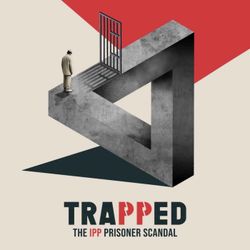
17. 17. A Poisoned Chalice
34:51||Season 1, Ep. 17Roddy Russell meets Lord Tony Woodley and former Prison Chaplain, David Kirk Beedon, who are both campaigning against indeterminate sentences.First, we must pass on some heartbreaking news about Josh McRae, whose story we featured in Trapped Episode 16. Josh tragically died at HMP Long Lartin, aged 34 in September 2024. An inquest into the cause of his death is ongoing. Rest in peace, Josh McRae.More than a year since we last heard from him, we catch up with Roddy Russell whose brother Robert, is still serving an IPP sentence, handed down in 2009. Roddy travels to Westminster in June 2025 to meet Lord Tony Woodley, whose Private Member’s Bill advocating resentencing for IPP prisoners is on the verge of reaching the ‘Committee stage’, prompting a debate in the House of Lords. Roddy wants to learn more about Lord Woodley's Private Member’s Bill and the prospect of the Bill making any significant changes for those serving IPP sentences.As the IPP debate commences in the House of Lords on the 4th July 2025, Roddy meets the author and former Prison Chaplain, David Kirk Beedon whose book, ‘Pastoral Care for the Incarcerated: Hope Deferred, Humanity Diminished?’ focuses on the experiences of those serving indeterminate sentences. David provides Roddy with an insight into the inner workings of prison and the Ministry of Justice.In the immediate aftermath of the IPP debate, we hear from Andrew Morris, Richard Garside and Baroness Fox, who all respond strongly to the Prison Minister, Lord James Timpson's closing speech. With his Private Member’s Bill for resentencing IPP prisoners in limbo, Lord Woodley leaves Roddy with words of encouragement and a rallying call: “we don’t give up”.Contributors in order of appearance:Lord Tony WoodleyRoddy Russell, brother of IPP serving prisoner Robert RussellDavid Kirk Beedon, author and former Prison Chaplain‘Pastoral Care for the Incarcerated: Hope deferred, humanity diminished?’ (Palgrave-Macmillan 2022)Andrew Morris, former IPP prisonerRichard Garside, The Centre for Crime and Justice StudiesBaroness Claire FoxVoices in Archive:Lord Tony WoodleyLord Edward GarnierLord Michael HastingsBaroness Claire FoxLord James Timpson, Minister of State for Prisons, Parole and Probation Production Credits:Presenter: Roddy Russell | @1roddyRussellExecutive Producer: Melissa FitzGerald | @MelissafitzgProducer: Steve Langridge | @SMLANGERSConsultant: Hank Rossi An Ear Worm Production for the Institute of NowGet involved:➕ Follow Trapped on X, TikTok, Facebook or Instagram @Trapped_Pod 🔎 Search #IPPScandal for more stories. 🗣️ Read more about the IPP campaign: UNGRIPP | www.ungripp.com | @UNGRIPP | IPP Committee In Action @ActionIpp | injustice_of_ipp ✔️ Like, follow and share this podcast to get people listening: knowledge is power and the more who know, the harder it is for injustice to take place. ✍️ Write to your MP and ask them to raise questions about IPPs in Parliament⬇️ Download the Trapped series episode transcripts here: https://drive.google.com___
16. 16. Indefinite Injustice
32:31||Season 1, Ep. 16Theresa and Josh’s story, plus Roddy Russell meets the Anglican Bishop for HM Prisons and delivers a letter of protest to 10 Downing St. Today we hear from Theresa, whose son Josh has been serving an IPP sentence since he was 18. Josh was sentenced to an IPP in 2008 for GBH, he’s now 34. When Sam meets Theresa in May 2024, Josh is still recovering from his recent set-back with the parole board. Theresa has shared an open letter from Josh in prison, written to alert the outside world of his crisis.We also catch up with Roddy Russell who was featured in Episode 4: A Catch 22 and who has now had the first visit in 4 ½ years with his brother Robert, who is serving an IPP at HMP Swaleside, Roddy doesn’t recognise his brother at first. Roddy also meets the Right Reverend Rachel Treweek, the Bishop of Gloucester, whose diocese covers the Forest of Dean, where Roddy and Robert grew up. Roddy is keen to raise Robert’s plight with Bishop Rachel as she sits in the House of Lords as the Bishop for Prisons. Bishop Rachel wants to see the end of the historic IPP sentences and she has since met Robert in prison to pray with him. Despite the welcome amendment to the Victim’s and Prisoners Act 2024, which has shortened the license period for IPP prisoners in the community from 10 to 3 years, for the IPP prisoners like Josh who are trapped inside on this indeterminate sentence, it doesn’t help them at all. Against the background of the prison crisis making headlines, a group of leading campaigners send an open letter to the new Labour Government to act quickly on IPPs.Roddy Russell is amongst those who travel to London to hand-deliver the letter to the Ministry of Justice. We hear from Roddy and his fellow campaigners outside of the MOJ as they reflect on the appointment of James Timpson as Minister of State for Prisons, Parole and Probation. Will he and the Labour Government finally put an end to the IPP scandal? Josh has a message for James Timpson and the other politicians: ‘imagine I was your son, please help me. I'm begging you.’Contributors in order of appearance: Theresa, mother of IPP serving prisoner Josh Mcrae Roddy Russell, brother of IPP serving prisoner Robert RussellThe Rt Revd Rachel Treweek, Bishop of Gloucester and Anglican Bishop for HM PrisonsMarc Conway, IPP prisoner on licenseAndrew Morris, IPP prisoner on license Richard Garside, The Centre for Crime and Justice StudiesVoices in Archive:James Timpson, Minister of State for Prisons, Parole and ProbationCredits: Reporter: Samantha Asumadu | @SamanthaAsumadu Executive Producer: Melissa FitzGerald | @Melissafitzg Producer: Steve Langridge | @SMLANGERS Consultant: Hank Rossi An Ear Worm Production for the Institute of NowGet involved:➕ Follow Trapped on X, TikTok, Facebook or Instagram @Trapped_Pod 🔎 Search #IPPScandal for more stories. 🗣️ Read more about the IPP campaign: UNGRIPP | www.ungripp.com | @UNGRIPP | IPP Committee In Action @ActionIpp | injustice_of_ipp ✔️ Like, follow and share this podcast to get people listening: knowledge is power and the more who know, the harder it is for injustice to take place. ✍️ Write to your MP and ask them to raise questions about IPPs in Parliament⬇️ Download the Trapped series episode transcripts here: https://drive.google.com___
